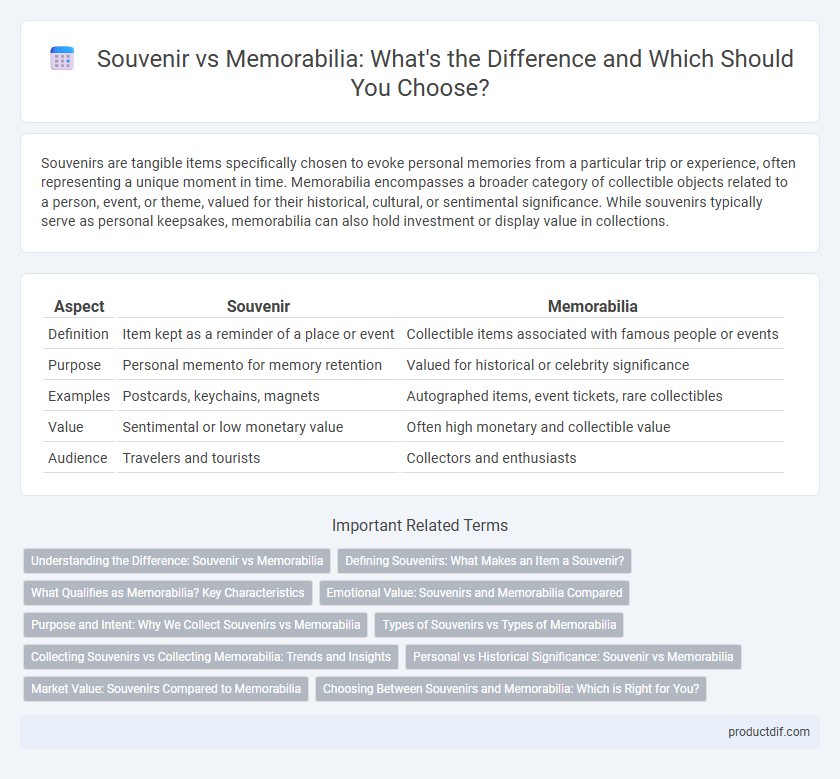Souvenirs are tangible items specifically chosen to evoke personal memories from a particular trip or experience, often representing a unique moment in time. Memorabilia encompasses a broader category of collectible objects related to a person, event, or theme, valued for their historical, cultural, or sentimental significance. While souvenirs typically serve as personal keepsakes, memorabilia can also hold investment or display value in collections.
Table of Comparison
| Aspect | Souvenir | Memorabilia |
|---|---|---|
| Definition | Item kept as a reminder of a place or event | Collectible items associated with famous people or events |
| Purpose | Personal memento for memory retention | Valued for historical or celebrity significance |
| Examples | Postcards, keychains, magnets | Autographed items, event tickets, rare collectibles |
| Value | Sentimental or low monetary value | Often high monetary and collectible value |
| Audience | Travelers and tourists | Collectors and enthusiasts |
Understanding the Difference: Souvenir vs Memorabilia
Souvenirs are typically small, affordable items purchased to remind travelers of a specific place or experience, often mass-produced and representing popular tourist landmarks. Memorabilia, on the other hand, holds deeper personal or historical significance, often linked to events, celebrities, or unique moments, and usually carries higher emotional or collectible value. Understanding the difference between souvenir vs memorabilia helps collectors and tourists make informed choices based on sentiment, purpose, and potential long-term worth.
Defining Souvenirs: What Makes an Item a Souvenir?
A souvenir is a tangible item purchased or collected to serve as a memento of a place, event, or experience, often symbolizing personal memories and cultural significance. Unlike memorabilia, which typically relates to historical or celebrity-related artifacts preserved for their rarity and value, souvenirs emphasize emotional connection and associative meaning. Key characteristics defining souvenirs include their origin from travel or special occasions, their role in evoking nostalgia, and their function as physical reminders of individual experiences.
What Qualifies as Memorabilia? Key Characteristics
Memorabilia refers to collectible items that hold historical, cultural, or personal significance, often linked to notable events, individuals, or milestones. Key characteristics include authenticity, rarity, and a tangible connection to the source, distinguishing memorabilia from casual souvenirs. These items usually carry sentimental or monetary value due to their association with important moments or celebrated figures.
Emotional Value: Souvenirs and Memorabilia Compared
Souvenirs often hold personal emotional value as tangible reminders of specific places or experiences, evoking fond memories and a sense of nostalgia. Memorabilia is typically associated with events, celebrities, or milestones, carrying sentimental worth linked to shared cultural or historical significance. Both serve as physical connections to emotions, but souvenirs emphasize individual travel experiences while memorabilia reflects collective or fan-based sentiments.
Purpose and Intent: Why We Collect Souvenirs vs Memorabilia
Souvenirs are collected primarily to capture personal experiences and serve as tangible reminders of specific places or events, enhancing individual memories. Memorabilia, on the other hand, often holds broader cultural or historical significance, collected to preserve and celebrate notable moments, achievements, or figures. The purpose of souvenirs centers on personal connection and nostalgia, while memorabilia emphasizes collective memory and historical value.
Types of Souvenirs vs Types of Memorabilia
Souvenirs primarily consist of items like postcards, keychains, magnets, and local handicrafts that represent a specific place or experience, often purchased during travel. Memorabilia includes objects such as signed sports equipment, concert tickets, and historical artifacts that hold sentimental or collectible value related to a particular event or person. While souvenirs capture memories through location-based tokens, memorabilia preserves emotional connections through items tied to significant moments or personalities.
Collecting Souvenirs vs Collecting Memorabilia: Trends and Insights
Collecting souvenirs often centers around personal travel experiences and tangible reminders of specific locations, while memorabilia focuses on items tied to events, celebrities, or cultural phenomena, appealing to broader fan bases. Trends indicate a growing interest in authentic, limited-edition souvenirs that capture unique moments, contrasted with memorabilia collectors prioritizing rarity and historical significance. Insights reveal the emotional connection drives souvenir collecting, whereas investment potential and provenance largely motivate memorabilia acquisitions.
Personal vs Historical Significance: Souvenir vs Memorabilia
Souvenirs typically hold personal significance as tangible reminders of individual experiences or travels, capturing unique memories and emotions tied to a specific moment. Memorabilia, on the other hand, carries historical or cultural importance, often linked to notable events, famous figures, or significant achievements that resonate broadly across communities. The distinction lies in souvenirs representing personal narratives while memorabilia embodies collective history and legacy.
Market Value: Souvenirs Compared to Memorabilia
Souvenirs generally hold sentimental value tied to personal experiences but often lack substantial market value compared to memorabilia, which is typically associated with historical significance or celebrity ownership. Memorabilia such as signed sports items or rare collectibles command higher prices in auctions and resale markets due to their rarity and provenance. Souvenirs are mass-produced and commonly found, limiting their investment potential relative to the niche and enthusiast-driven demand for authentic memorabilia.
Choosing Between Souvenirs and Memorabilia: Which is Right for You?
Souvenirs typically capture the essence of a specific place or event through tangible keepsakes like postcards or keychains, perfect for casual reminders of travel experiences. Memorabilia holds greater emotional or historical significance, often linked to famous events, people, or achievements, making it ideal for collectors seeking meaningful connections. Choosing between souvenirs and memorabilia depends on whether you value convenience and broad appeal or depth of personal or cultural significance.
Souvenir vs Memorabilia Infographic

 productdif.com
productdif.com